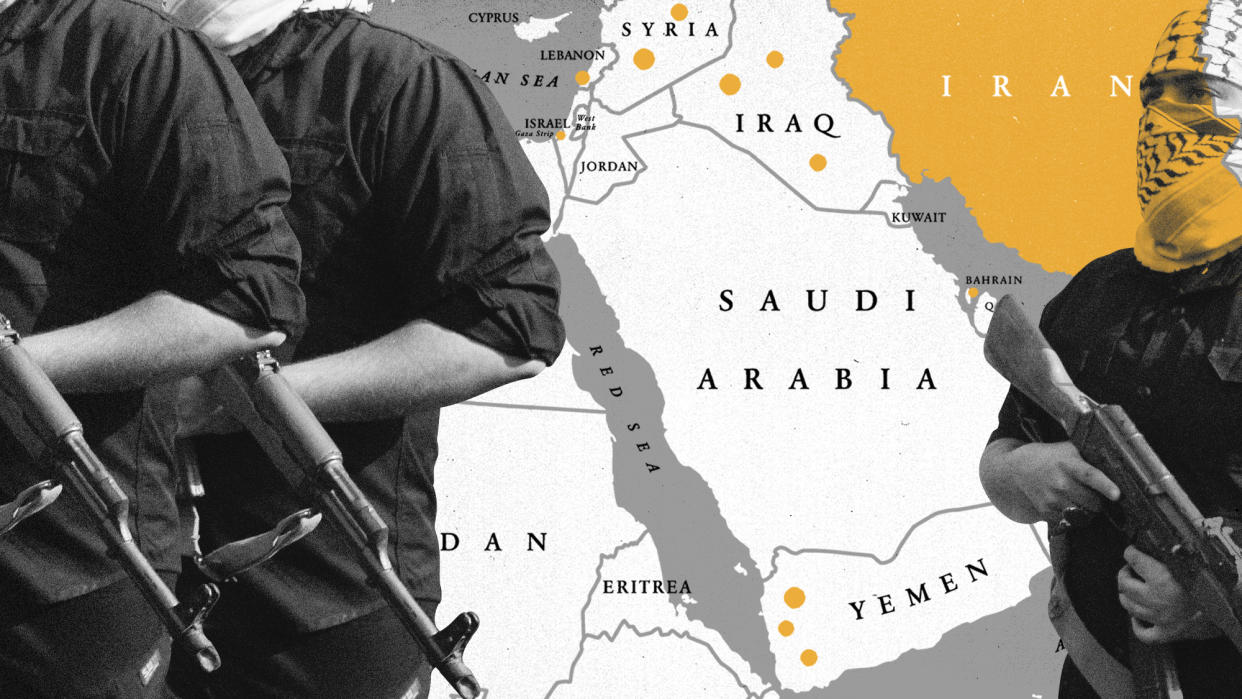What do Iran and its proxies want from Middle East escalation?

In the space of 24 hours this week, Iran launched missile attacks on neighbouring Iraq and Pakistan, as well as Syria.
Iran says its Islamic Revolutionary Guard Corps (IRGC) was targeting various anti-Iranian terrorist groups, including Jaish al-Adl in Pakistan, and Islamic State (IS) in Iraq and Syria. It also claimed it destroyed an Israeli Mossad spy agency in Iraq.
Iran has been "perhaps stung by recent deadly attacks on home soil", said the BBC, and is seemingly "intent on exacting revenge on those it sees as responsible".
Its attack on nuclear-armed Pakistan, however, represents a "dramatic escalation". Islamabad labelled the strikes "illegal" and said there would be "serious consequences", launching retaliatory strikes early on Thursday morning.
The neighbouring countries have "long regarded each other with suspicion", said Sky News, with Pakistan a majority Sunni Muslim state, and Iran a Shia-dominated country.
The further ratcheting up of tensions in the region comes as Israel and Hamas's brutal conflict in Gaza rages on, and Iran's proxy groups in its "axis of resistance", including the Houthis in Yemen and Hezbollah in Lebanon, carry out attacks that are linked to the conflict.
What the papers said
Despite the Iranian strikes coming at a time when stakes could not be higher in the Middle East, Tehran denies any link to the conflict in Gaza, insisting that it "does not want to get involved in a wider conflict", said the BBC. Yet the proxy groups it supports say their attacks – Hezbollah's on Israel's northern border and the Houthis on ships in the Red Sea – are "to show solidarity with the Palestinians", while Iran also supports Hamas.
What's more, Iran's foreign minister, Hossein Amirabdollahian, said on Wednesday that "attacks against Israel and its interests" by the proxy groups would cease "if the Gaza war ends", and warned the Israel-Hamas conflict could "heighten tensions across the Middle East", said Reuters.
Even if the Iranian strikes are not linked to the war in Gaza, it shows "bolder direct action" from Tehran, said CNBC, and it could be expected to make more significant moves against militant groups it is targeting in the future.
Its latest moves stem from this growing escalation across the region, which is "gravy" to Iran and its "aggressively authoritarian regime", wrote Simon Tisdall in The Guardian. Working on its aims of pushing the US "out of the Middle East", retaining its "regional pre-eminence" and strengthening its "key alliances with China and Russia", it is clear Iran has "assembled a remote-controlled coalition of the willing to outlast the US".
The regime in Tehran, however, is "careful to avoid any direct confrontation with the United States", said Jawad Iqbal in The Spectator. But, despite denying any operational control of them, it is "willing to press its proxy forces into action when it suits" to achieve its aims. The "regional instability" this creates enables the regime to "reinforce their hold on power back home", he wrote, and "demands loyalty" from Iranians by constructing the illusion the country is "under growing threat from a range of sinister forces".
For Iran's supreme leader, Ali Khamenei – now 84 and reportedly in poor health – and his regime, regional instability helps "deflect from the growing problems at home". A bomb in early January that killed 94 people in Kerman "shook the regime to the core", added Iqbal, and its response was to "lash out at perceived enemies".
What next?
The most "curious feature" of events so far in the Middle East is the "care taken" by Tehran and Washington to "avoid putting their forces into direct contact", said The New York Times.
American intelligence, it reports, said "Iran is not interested in a wider war", despite increasing hostilities from its proxy groups, as it aims to "find a way to punch at Israel" without all-out conflict. There are further warnings too that Tehran is "speeding" again towards nuclear armaments, having "ramped up" its production of uranium "drastically", the paper added.
But Iran has proved it has become the "big kid on the block" in the Middle East, added The Guardian's Tisdall, and for the West "sanctioning, ostracising and threatening" it has not worked. With its "global alliance" and its "powerful militias and economic might", it has become a "formidable opponent", he concludes. And the US and Britain must "urgently" find a "fresh diplomatic approach" to resolve the crisis and avoid war.

